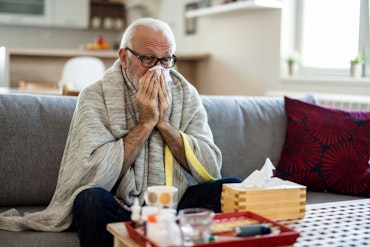It’s a pass for Victoria’s Voluntary Assisted Dying legislation
Victoria has made history as the first Australian state to pass voluntary assisted dying laws following successful debates in both the Victorian Parliament upper and lower houses and years of consultation and dedication.

Victoria is the first Australian state to pass Voluntary Assisted Dying laws (Source: Shutterstock)
Now, officially passed, the legislation is set to go through an 18-month implementation period before it comes into effect from June 2019.
The Victorian Government – led by Premier Daniel Andrews – says the passed legislation is the result of two and a half years of extensive consultation and engagement with Members of Parliament, the community, health, palliative care and legal sectors, including the Parliament’s Legal and Social Issues Committee’s Inquiry into End-of-Life Choices and the Expert Ministerial Advisory Panel.
“Victoria is the first state to pass voluntary assisted dying laws in Australia – giving Victorians with a terminal illness the compassion and dignity they deserve at the end of their lives,” Premier Andrews says.
Victorian Minister for Health Jill Hennessy is a known advocate of the legislation and reiterated Premier Andrews comments saying: “After two and a half years of hard work and consideration by so many in our parliament, the passing of the Bill will finally give Victorians more control, compassion and support at the end of their lives.”
The legislation will be available to Victorians living with a terminal illness, but has not come through without some amendments.
Some of the amendments along the way include:
- Voluntary Assisted Dying will be limited to those whose death is expected in weeks and months, but no longer than six months – a reduction from 12 months. There will be exceptions for those who are suffering from a neurodegenerative condition and whose death is expected within weeks and months but for a period no greater than 12 months to access it.
- A person must have lived in Victoria for at least 12 months before being able to make a request
- A person with a mental illness must be referred to a psychiatrist for an assessment
- The assessing doctor must encourage the person to inform their regular doctor of their intention to access voluntary assisted dying, if the assessing doctor is not the person’s regular doctor
- The contact person is required to return any unused voluntary assisted dying substance within 15 days (not 30)
- The review Board has a role to follow up with the contact person to advise on the safe return of any unused medication
- The coroner will be informed of voluntary assisted dying deaths
- Death certificates for people who have chosen voluntary assisted dying will record the manner of death as voluntary assisted dying.
Regarding the changes pushed through by Victorian Parliament, Attorney-General Martin Pakula says: “ We have ensured we have compassionate legislation while still giving Victorians the protections and safeguards they need – making this the most conservative and safest scheme in the world.”
The Australian Nursing and Midwifery Federation (Victorian Branch) is one group who has had a policy supporting voluntary assisted dying since 1995 and believes the law is a safe and compassionate response to who Secretary Lisa Fitzpatrick is calling the “quieter voices of dying Victorians”.
“It takes courage for politicians to change their minds, to listen to those who are not well enough to organise campaigns or protest in the streets and to respond with such empathy,” she says.
“We have enormous respect for Health Minister Jill Hennessy and Premier Daniel Andrews for the intelligent and comprehensive consultation process that laid the foundations for passing this important law.
“Under this law terminally ill Victorians, who make a voluntary assisted dying request, will have more access to palliative care options and further specialist review of their illness or condition and their choice will be covered by a safe legal framework. Importantly people will talk more to their doctors about the dying process.”
Ms Fitzpatrick acknowledges that it has been a difficult ethical debate and says the ANMF Victorian branch looks forward to making a contribution towards the work required over the next 18 months to prepare for the introduction of this legislation.











![The new Aged Care Act exposure draft is slated for release in December of 2023, but advocates hope to see it rolled out on January 1, 2024. [Source: Shutterstock]](https://agedcareguide-assets.imgix.net/news/articles/wp/agedcareact__0811.jpg?fm=pjpg&w=520&format=auto&q=65)












Comments